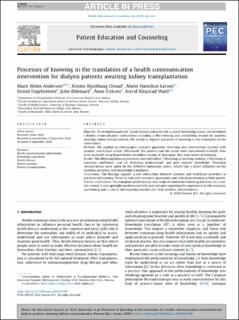Processes of knowing in the translation of a health communication intervention for dialysis patients awaiting kidney transplantation
Andersen, Marit Helen; Urstad, Kristin Hjorthaug; Larsen, Marie Hamilton; Engebretsen, Eivind; Ødemark, John; Eriksen, Anne; Wahl, Astrid Klopstad
Peer reviewed, Journal article
Published version
Permanent lenke
https://hdl.handle.net/11250/3042639Utgivelsesdato
2020Metadata
Vis full innførselSamlinger
Originalversjon
Andersen, M. H., Urstad, K. H., Larsen, M. H., Engebretsen, E., Ødemark, J., Eriksen, A., & Wahl, A. K. (2021). Processes of knowing in the translation of a health communication intervention for dialysis patients awaiting kidney transplantation. Patient Education and Counseling, 104(3), 517-523. 10.1016/j.pec.2020.09.009Sammendrag
Objective
To strengthen patients’ health literacy and their role as active knowledge actors, we developed a health communication intervention including a film-viewing and counselling session for patients awaiting kidney transplantation. We aimed to explore processes of knowing in the translation of the intervention.
Methods
We applied an ethnographic research approach, observing nine intervention sessions with patients and dialysis nurses. Afterwards, the patients and the nurses were interviewed in-depth. Data were analysed using Engebretsen’s modified version of Lonergans’ four-step model of knowing.
Results
The following knowing processes were identified: i) Knowing as meaning-making; ii) Knowing as acquiring confidence; and iii) Accessing professionals’ and peer experts’ knowledge. Divergent considerations were taken by the different knowledge actors, which had a direct influence on the knowing processes and knowledge translation.
Conclusions
The findings support active interactions between patients and healthcare providers in processes of knowing. These include self-conscious approaches and critical questioning in both parties.
Practice implications
For transplant professionals, this study demonstrates knowing processes in a real-life context. It also spotlights professional skills and attitudes regarding the importance of self-conscious questioning and a critical interrogating position (for both patients and providers).

